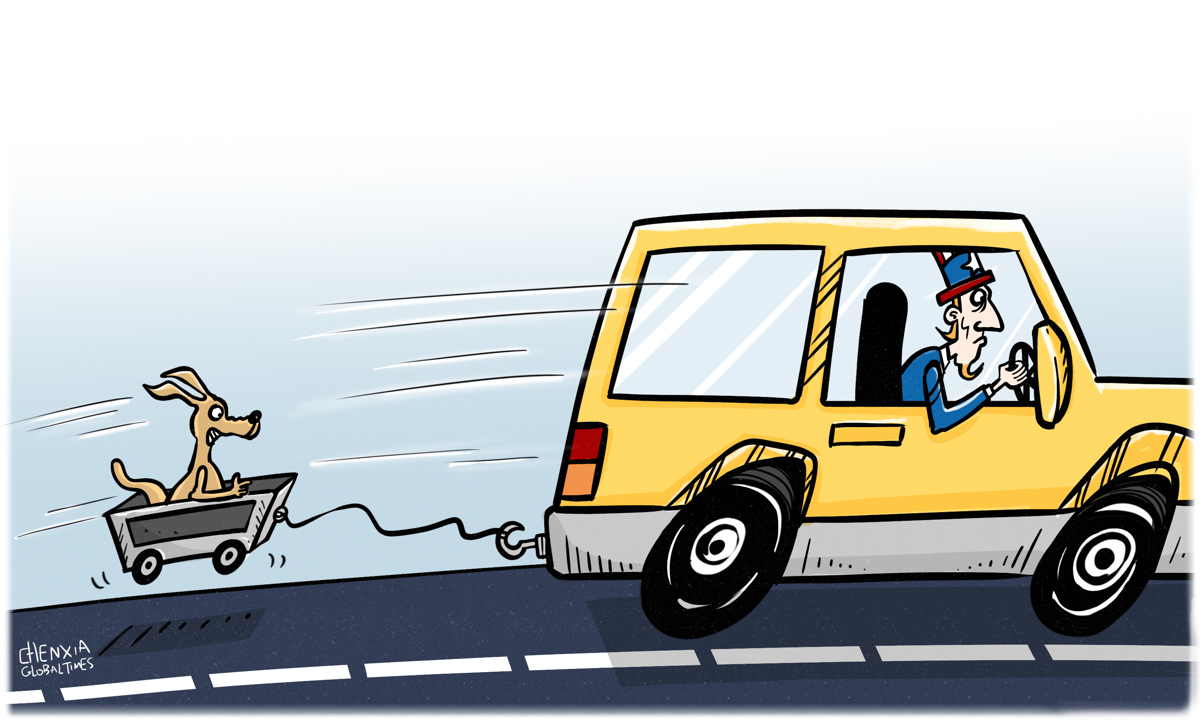
Illustration: Chen Xia/GT
I have been asked to write an op-ed on the 50th anniversary of the establishment of diplomatic relations between China and Australia, an event which I remember gave many people in Australia great satisfaction.I was a new Third Secretary on a posting to Islamabad, Pakistan, when I learnt of the establishment of diplomatic relations. It was a development we had anticipated as university students and as junior diplomats greeted it with relief and anticipation of positive things to come. And, as we know, until very recently this was the case. Throughout my diplomatic career I enjoyed warm and close relations with my Chinese diplomatic colleagues, particularly in Pakistan and Afghanistan, between 1972 and 1973 and between 1986 and 1988.
My generation of young Australian diplomats looked forward to a much closer relationship with Asia and Africa. Even in 1972 China was seen by us as the key. Prime Minister Whitlam threw off the shame of our involvement in the American war in Vietnam, which was a disaster and negatively affected not only our relations in Asia but also in Europe and Africa.
Our future seemed tied to Asia until Whitlam was dismissed from office. Some speculated that this was done by the US and UK, who became concerned that Whitlam might move against what they perceived as their long-term strategic interests centered around the US defense intelligence gathering facility of Pine Gap in the Northern Territory.
This has had the effect of making some in the Labor Party become shy of the US. The exception being former Labor Prime Minister Paul Keating, who still offers thoughtful and positive analysis of what should be Australian foreign policy toward the region. He advocates for strong regional relationships particularly with China.
The current Australian Labor Prime Minister, Anthony Albanese has, on poor advice, rejected Keatings analysis. Luckily, he has a Foreign Minister, Penny Wong, who sees things differently. She understands the diplomatic realities of the region. However, she struggles to have her voice heard. Unluckily Australia has a Defense Minister, Richard Marles, who gives every indication of having been captured by the US industrial/military complex. He is close to the right wing, partially US funded Australian Strategic Policy Institute (ASPI), a self-styled think tank motivated by Sinophobia.
This leads into the question that was put to me, ‘How will Australia dance between China and the US? China is Australia’s biggest trading partner, in addition, over the past fifty years strong cultural, academic and familial ties have been established. However, all have been put in jeopardy by Australia’s unquestioning loyalty to what is termed the US-Australia alliance. It is a one-sided relationship with Australia happy to play the role of a vassal. This arrangement comes despite the lessons of Vietnam, Iraq and Afghanistan, wars which America lost and in which Australia participated.
For the leadership of both major political parties in Australia, the US can do no wrong. This stems from a national lack of self-confidence constantly requiring bolstering from success in international sporting competition. Australia understands the concept of physical courage, it is mythologized in what is termed the ANZAC tradition relating to feat of arms in WWI and WWII, what it does not understand, applaud or encourage is moral courage. This deficit is apparent in the inability to push back against pressure from the US for Australia to demonize China. It also casts Australia as a follower, not a leader, obvious in its recent panicked dealings in the Pacific.
Underlying racism, fear of the unfamiliar coupled with an inferiority complex sees Australia susceptible to US fear mongering over the China “threat.” This threat has been peddled by the mainstream media in the US, the UK and Australia. It has led to the American creation of AUKUS, a tri-lateral security pact whose intentions and activities for the most part remain secret. Details have not been tabled in the Australian parliament, the lack of which challenges the Australian democratic process.
From leaks to the media, it appears AUKUS is an arrangement to allow the US greater access to Australian territory and defense facilities from which to confront and perhaps attack China. It is ill-conceived and does nothing to enhance Australian security or diplomatic undertakings in the region.
AUKUS was said to be about the acquisition of nuclear submarines by Australia but the lag times on delivery are so long as to make that contention risible. Far more likely it would appear that talk of Australian submarines is a smokescreen for the basing of US nuclear submarines in Australia.
The biggest single problem in Australia getting back into rhythm with China and resuming a nice easy quick step is getting America to desist applying pressure on Australia. America is unlikely to pull back, its goal is the containment of China using Taiwan as the bait. Australia must assert itself and to do that Prime Minister Albanese needs to realize that if he stays on his present path Australian sovereignty is at risk, if it hasn’t already been undermined. He needs to get a greater, independent and more sophisticated understanding of the region and China.
This is where China also has a role in not haranguing the Australian government but taking a more benign approach as one would with a pupil trying to get on top of a subject and catch up with assignments.
The author is a retired Australian diplomat and political commentator. opinion@globaltimes.com.cn

